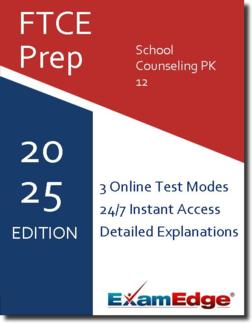FTCE Guidance and Counseling (018) Practice Tests & Test Prep by Exam Edge - Topics
Based on 25 Reviews
- Real Exam Simulation: Timed questions and matching content build comfort for your FTCE School Counseling PK 12 test day.
- Instant, 24/7 Access: Web-based FTCE School Counseling PK 12 practice exams with no software needed.
- Clear Explanations: Step-by-step answers and explanations for your FTCE exam to strengthen understanding.
- Boosted Confidence: Reduces anxiety and improves test-taking skills to ace your FTCE School Counseling PK 12 (018).

Understanding the exact breakdown of the FTCE School Counseling PK 12 test will help you know what to expect and how to most effectively prepare. The FTCE School Counseling PK 12 has 100 multiple-choice questions The exam will be broken down into the sections below:
| FTCE School Counseling PK 12 Exam Blueprint | ||
|---|---|---|
| Domain Name | % | Number of Questions |
| Knowledge of counseling | 10% | 10 |
| Knowledge of programs and interventions for addressing current issues in schools | 10% | 10 |
| Knowledge of assessment in promoting student success | 10% | 10 |
| Knowledge of career development and postsecondary opportunities | 10% | 10 |
| Knowledge of consultation, collaboration, and coordination | 10% | 10 |
| Knowledge of professional, ethical, and legal considerations | 10% | 10 |
| Knowledge of student appraisal and advisement | 10% | 10 |
| Knowledge of the development and assessment of exemplary comprehensive school counseling programs | 12% | 12 |
| Knowledge of technology and digital citizenship | 8% | 8 |
| Knowledge of cultural competence for school counselors | 10% | 10 |


